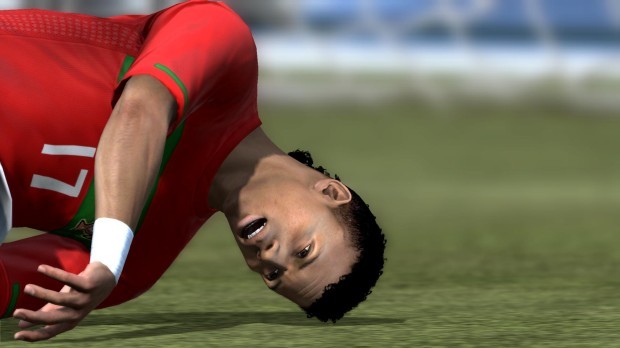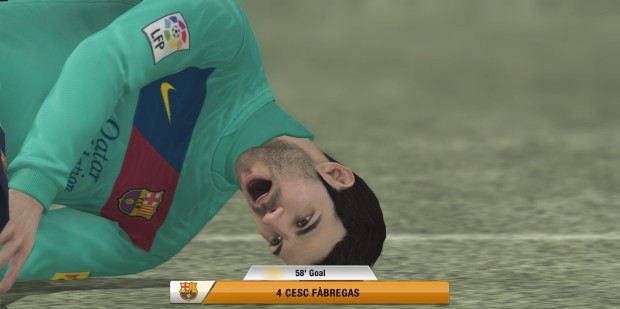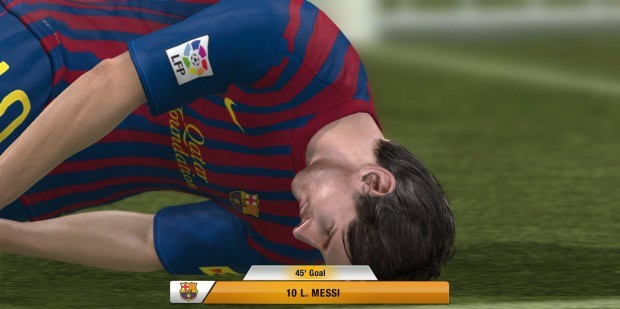The Videogame Monument I'm Most Proud To Have Built
An Ode To A Spreadsheet
This isn't about building willies in videogames.
Or, well, not literally.
I've built castles in Minecraft, multiplayer maps for Half-Life, underground lairs in Dwarf Fortress and, yes, many schlong-shaped monsters in Spore, but the game-related object I'm most proud of creating is a spreadsheet.
The spreadsheet has one column with my name at the top of it, and a second column with my friend Rich McCormick's name. Underneath that is a colour-coded list of football teams, each pairing representing a match played in FIFA 13. Red is a loss, green is a win. Over almost a year of lunchtimes and late nights in the office we shared, we played 439 games, recorded the results for each, and noted down a few comments about what happened during the match.
Northern Ireland 0, Stoke City 2. "Northern Ireland had 16 shots, no goals. Stoke City had around 6 shots. Mega frustration for Graham."
Toulouse 0, SonderjyskE 4. "Graham didn't like Toulouse. TO LOSE. Do you get the joke?"
We were writing this list for ourselves, and you can tell which one of us wrote any given entry by who gets excused and who gets mocked.
The endeavour started as a way to give context and meaning to an otherwise disconnected series of friendlies, and of bringing order to a system wild with FIFA's idiosyncracies. For example, the game's random button on the team selection screen is a joke, picking the same small number of teams over and over and over again.
"Plucky Tijuana smash one of the world's best teams."
"We get Tijuana more than any other team. "Random", psh. This game proves Rich's total Tijuana dominance."
"Another Tijuana, another Rich win."
"Tijuana fuck off?"
To avoid having to play as CSKA Moskva more than 16 times, we first started allowing ourselves multiple presses of the randomise button to determine teams. When that proved similarly predictable, we selected teams by closing our eyes, pushing the stick in a random direction and playing whatever team we landed upon.
Eventually we learned the timing to shift from one league to another with our eyes closed - push right from England for seven seconds and you'll land on the miscellaneous team category, inside of which you'll find the Classic XI, a super-team consisting of history's greatest footballers. So we banned that team, and then any team less than four star, and so on. Our rules changed, but the spreadsheet made sure everything was logged, was consistent, that it all mattered.
Sunderland 3, Brazil 1. "Brazil go 1-0 up then fall apart. Sunderland slot one in the corner, head another, get a third from a failed clearance."
It also keeps track of our running jokes, and through that works as a strange piece of game criticism. A recurring theme is "cheat players"; real-world footballers with skills that translate in over-powered ways to FIFA's abstracted simulation, or who have simply been poorly balanced. Samuel Eto'o possesses an uncanny ability to score from forty yards away ("'I hate fucking magic Eto'o, this is such bullshit.' - Graham Smith, 2012", reads one log entry), while Ibrahimovic causes defenders and goalkeepers to crumple in fear in front of him ("Ibra, Ibra, Ibra, Ibra. Magic man Ibra," reads another).
Most of all though, the spreadsheet is a diary for a year in our lives. You wouldn't know it from the colour-coding or the notes, but the document is thick with memories. Part of the reason for that is that FIFA is a tight, tense game when played by two people who know one another well. You reach a point where you can flawlessly predict when the other person is going to cut inside with a winger, when they're teeing up for a curling shot, when they're moving their goalkeeper for a short throw-out or a long punt. Games are therefore won and lost by some uncontrollable, immeasurable quantity of mental focus, and that can change based on who has had a good morning, who got the Boots meal deal for lunch they wanted, or whatever else was happening in our lives.
This sounds absurd, but it's all in the spreadsheet in red and green. I can point to a particular stretch of red in my own column - representing a losing streak - and remember that it was because I was stressed about moving house at the time. ("Excuses!", Rich would say). I can then point to a similar column of red on Rich's side, which he would justify by blaming it on the stress of planning his imminent departure from where we worked.
Which was how, in the end, the spreadsheet stopped. We played a series of final games, tallied up the W-L-D, calculated our points, and declared a winner. I'm not going to tell you who - you can see the spreadsheet for yourself if you care - because who won isn't the point. ("Excuses!"). I'm proud of the spreadsheet because it took commitment to create, because it's a mental map of a particular period of my life, and because it's a monument to a mad, year-long obsession. Everyone should make one.




